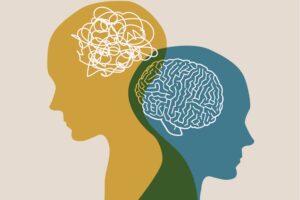Mental illness is often the result of struggles that arise, leading people to be unable to care for themselves properly. Mental illness can be impacted by various environmental, mental, societal, and physical factors.
Alcoholism falls under addiction, which is classified as a disease, and though it can be difficult, it is a disease you can find a cure for. Unfortunately, there is no medication or specific treatment that cures it; it comes down to your specific needs.
Both alcoholism and mental illness are highly stigmatized in today’s society. You may have a mental illness that is not related to alcoholism, but if you suffer from Alcohol Use Disorder (AUD), you classify it as a mental illness.
The best thing you can do is to seek specialized treatment to treat all underlying mental illnesses that may or may not be contributing to your alcohol use.
Keep reading to learn more about how alcoholism and mental illness are intertwined.
Alcohol and Mental Health
To best understand how alcohol and mental health coexist, it’s best to understand how alcoholism can happen and the different stages. Alcohol is a commonly used substance that doesn’t always lead to substance abuse, but having other mental health issues can contribute to substance misuse.
By getting to the bottom of the correlation between these two, you can begin to see why you or a loved one might struggle with both.
What Is Mental Illness?
Because alcoholism is a mental illness, it’s important to understand what it entails. Mental illness prevents a person from behaving or coping normally, meaning the ability to regulate emotions or make good decisions can feel more difficult.
Mental illness can bring forth pain not visible to the eye, but that doesn’t mean it isn’t there. It can also be very difficult and, for some, embarrassing to come forward about their struggles with mental illness. This means that not everyone gets the correct help to feel better.
As a result, more people turn to self-medicating to numb their pain. Alcohol and other substances have effects that can trick you into thinking that you’re no longer depressed or anxious. This is where the tie between mental illness and alcoholism comes into play.
What Is Alcoholism?
Alcoholism is unfortunately common and sometimes difficult to see happening right in front of you. There are different levels of alcoholism that all impact the brain and your life. Catching on early can really help to find the root of the problem and get you treatment sooner than later.
Problematic Drinking
What may have once been social drinking and very casual can become problematic. At this stage of alcoholism, it may not even be noticeable to the person drinking that things are taking a turn for the worse. But those around might begin to notice changes in behavior and increased drinking.
Financial and health issues may begin to arise during this period. Withdrawal symptoms are prevalent enough that when there is a lack of alcohol in the system, the person will feel cravings for it. This person will need alcohol to do just about anything, including wake up and get to work or function in social settings.
Severe Alcohol Abuse
After the problematic stage, you enter into severe alcohol abuse. At this point, the user is dependent on the substance and will experience rough withdrawal symptoms if they don’t drink daily. This stage impacts both the physical and mental health of a person.
You might experience more irritability, anger, stress, anxiety, depression, and aggression. It will be more difficult to control these feelings; others might view you as unpredictable. People around you may mention the issues they see, but often apprehensively.
At this stage, it is common to see people pulling away from their friends and family who want the best for them because it goes against what alcohol demands.
Obsessive Alcohol Abuse
Full-blown alcoholism has set in at this point. The user will need alcohol in their system at any point of the day to ‘function.’ This is because they have been programming their brain to expect alcohol, so when there isn’t enough in the body, the body feels like it’s going to shut down.
Often, an alcoholic will be so consumed with ensuring when they get their next drink that, it’s the only thing on their mind.
How Does Alcohol and Mental Illness Impact Each Other?
Alcoholism and mental illness is not a cause-and-effect situation. Instead, they often co-occur because of the way that they can both contribute to each other. Mental illness can contribute to substance use, and substance use can greatly impact mental health.
Co-Occurring Diagnosis
A person might use substances to try to minimize their feelings of depression, but at the same time, those substances can increase anxiety or paranoia. Over 50 percent of people with substance use disorder also have one or more mental illnesses.
Having a co-occurring diagnosis can be both helpful and difficult at the same time. When you know what you’re trying to treat, you can get the proper treatment to help both disorders. Though, having a co-occurring diagnosis means you’re more likely to struggle more intensely, with both disorders feeding into each other.
Affecting the Brain
In recent years, studies have looked more deeply into the impact alcohol has on the brain. It has been found that the more you drink, the more likely your brain’s makeup is to alter and significantly become less functional.
Your brain becomes dependent on the alcohol you’re feeding it, so without alcohol in the system, your brain will react negatively. It thinks that something is wrong if there is no alcohol in the body, convincing you that you need more to be okay.
Alcohol affects the prefrontal cortex and cognitive function, the basal ganglia, which supports motor function, and the extended amygdala, which controls reward recognition. If these parts of the brain are being impacted, it will increase the cravings an alcoholic feels.
Avoiding Treatment
As mentioned above, it can be difficult to find the right treatment when you struggle with a co-occurring diagnosis. Many people go undiagnosed for their mental illness or substance abuse, so when they go to get treatment for the other (if they do), they aren’t given the proper treatment plan.
This can lead to fewer people seeking out treatment. Especially if they had tried in the past but found that all the plans they tried were unsuccessful. If you aren’t considering all aspects of your mental health, you may not find success easily.
Is Alcoholism Considered a Mental Illness?
The short answer is: yes. Alcoholism and alcohol use disorder are considered to be mental illnesses. This became the case in 1980 when the American Psychiatric Association identified it as a primary mental health disorder in the DSM. This means that it’s not a choice to become an alcoholic and that there are treatments that can help you fight back and enter recovery.
Alcoholism is not just a problem for a certain kind of person in a specific setting. It can affect anyone at any stage in their life. Treatment is necessary to overcome substance abuse.
Getting Treatment for Alcoholism with Soba Recovery
At Soba Recovery Center in San Antonio, Texas, you don’t have to worry about getting the right treatment plan because we work with you to understand your needs better. During the screening process, we will dive into your past medical and mental health issues to see if you could be struggling with co-occurring mental illness and substance use disorder.
Not only will your substance use be treated through medically-assisted treatment (MAT) and therapy, but your mental health will be considered and treated as well. If you’re experiencing withdrawal symptoms, staying in an inpatient or detoxification program is in your best interest. This will give more responsibility to you and your actions.
During treatment, you are taught how to cope with your mental illness, improve your health, and regulate your thoughts and emotions better. All of this will become much easier as you progress through your recovery.
Soba Recovery offers inpatient services for those who need 24/7 around-the-clock care, outpatient care for those who still need to maintain some of their responsibilities, and sober living for people looking to find support in their community with like-minded individuals. If this could benefit your recovery journey, reach out to a Soba representative today!
Sources:
Alcoholism and Psychiatric Disorders | NIAAA





